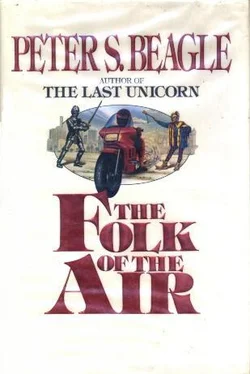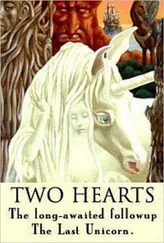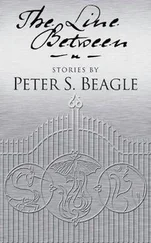The Bay took up half the horizon, rumpled and dingy as a motel bedspread, with a few sails frozen under the bridge and San Francisco beyond, slipping like soap through a dishwater mist. From where Farrell stood in the private sunlight of Scotia Street, treetops and gables broke up his line of sight; but he could make out the university’s red-brick bell tower and the campus plaza where he had first met Ellen hustling chess games with freshmen. And if that’s the corner of Serra and Fox, then that window has to be the Nikolai Bukharin Memorial Pizza Parlor. Two years waiting tables and breaking up fights there, and I still always got him mixed up with that other one, Bakunin . The only movement that he could see anywhere was the green wink of a streetcar sliding down through the flatlands, vanishing between the naked pastel roofs that seemed to overlap one another like lily pads all the way to the freeway. He stood on tiptoe for a moment, looking for the Blue Zoo, the warty indigo frog of a Victorian in which he and Clawhammer Perry Brown and a Korean string trio had shared the top floor rent-free for almost three months, before the party downstairs ended and the owner noticed them. Did I dream all that, that time, those people? What begins now ?
Walking up the stump-flagged path to Ben’s house, he unwrapped the lute, his chest aching with gratitude to find it whole. He sat down on the porch steps, marveling as always at the sight of his own hand on the long golden curve of the instrument, as he had once caught his breath to deny the miracle of his hand touching a woman’s bare hip. He hugged the lute gently into his belly and held it there, and the coupled strings sighed into the air, though he had not yet touched them.
“Come on, love,” he said again. He began to play Mounsiers Almaine , too fast, as he often took it, but not trying to slow it down. After that he played a Dowland pavane, and then Mounsiers Almaine again, properly this time. The lute grew warm in the sun and smelled like lemons.
The old woman said, “You had better be Joe Farrell.”
Afterward, at odd times and places, he liked to think about the first time that Sia and he ever looked at each other. By then he remembered no single detail of the moment, except that both of them had instinctively clutched something close—Farrell his lute, and Sia the belt of the worn blue robe, which she drew tight under her heavy breasts. Sometimes he did recall being instantly certain that he had just met either an old friend or a very patient, important enemy; more often he knew that he was making that up. But he felt strange trying to imagine not knowing who Sia was.
“Because if you are not,” she said, “I have no business being out here at six in the morning listening to a strange lute player on my front porch. So if you are Joe Farrell, you can come in and have breakfast. Otherwise I am going back to bed.”
She was not tall, actually, nor was she very old. Ben had described her hardly at all in his letters, and Farrell’s first vision had been of a great, drowsy monolith standing above him, a menhir in a frayed flannel bathrobe. As he stood up, he saw that the broad, blunt-featured face was no older than sixty, the dark-honey skin almost without lines, and the gray eyes quick and clear and imperiously sad. But her body was as lumpy as a charwoman’s—waistless, short-legged, wide-hipped, bellied like the moon—although she carried it with all the vivid rigor of a circus wire walker, even in bedroom slippers like heaps of fluffy slush. The bathrobe was too long for her, and Farrell shivered slightly to realize that it must be Ben’s robe.
“You’re Sia,” he said. “Athanasia Sioris.”
“Oh, I know that,” she answered, “even this early. What about you? Have you decided if you’re Joe Farrell yet?”
“I’m Farrell,” he said, “but you can go back to bed anyway. I didn’t mean to wake you.”
Her hair was very thick and a little coarse, gray and black together, like a winter dawn. It fell down between her shoulder blades, caught, not in a ribbon, but with a gnarled silver ring. Her eyes had almost no white to them. Farrell could see the pupils breathing slowly in the morning light, and he fancied that he felt their full weight testing his strength, as boxers will lean thoughtfully on each other in the early rounds. She said, “Am I afraid of you?”
Farrell said, “When Ben first wrote me about you, I thought you had the prettiest name in the world. I still do, except maybe for a woman named Electa Arenal de Rodriguez. It’s a close thing either way.”
“Am I afraid of you?” she asked again. “Or am I glad to see you?” Her voice was low and hoarse, the Greek accent less of a sound than an aftertaste; not unpleasant, but not an easy voice, either. He could not imagine it teasing, consoling, caressing— Christ, she’s older than his mother —or telling lies. It was a voice suited only for asking nettly questions with no safe answers.
He said, “No one’s ever been afraid of me. It would be grand if you were, but I don’t really expect it.”
She had been looking at him, so it was not that the dark regard suddenly shifted or focused on him more intensely, but rather as if he had managed to attract the attention of a forest, or of a large body of water. “What do you expect?” Farrell stared back at her, too tired and uncertain even to shrug, almost peacefully at a standstill. Sia said, “Well, come in, good morning.”
She turned her back; as she did so, Farrell felt a curious desolation pass over him—a fox-fierce little autumn wind of abandonment and loss that might have blown out of his childhood, when sorrows were all the same size and came and went without ever explaining themselves. It was gone instantly, and he walked into the house, following a middleaged woman in a blue bathrobe who moved cumbrously on legs that he knew must have varicose veins.
“Sia’s house is a cave,” Ben had written to him three years ago, having lived with her then for more than a year. “Bones underfoot, little clawed things scampering in the shadows, and the fire leaves greasy stains on the walls. Everything smells of chicken blood and skins drying.” But that morning Farrell thought the house was like a green tree, and the rooms were branches, high and light and murmurous with the sounds that wood makes in the sun. He stood in the living room, studying the manner in which the toast-colored boards of the ceiling went together like the back of his lute. There were books and big windows; mirrors and masks, small, thick rugs, and furniture like drowsing animals. A chess set stood on a low cast-iron table in front of the fireplace. The pieces were of wood, worn almost as round and featureless as the spindles of the staircase. Farrell saw a tall old windup phonograph in a corner, next to a wicker basket full of pampas grass and rusty spears.
She led him to a small kitchen where she scrambled a lot of eggs and made coffee, working swiftly with brown, rather stubby hands, saying very little and never looking at him. But when she was done, she brought their plates to the table and sat down across from him, settling her chin between her fists. For a moment the gray eyes—clear and savage as snow water—regarded him with an earnest, personal hostility that seemed to lick along his bones, scouring them hollow. And then Sia smiled, and Farrell took a very quick breath before the mischief of the women and smiled at her.
“I’m sorry,” she said. “May I take the last fifteen minutes back?”
Farrell nodded seriously. “If you leave the eggs.”
Sia said, “Frightened lovers are hideous. I have been dreadful to Ben for a week, just because of you.”
Читать дальше












